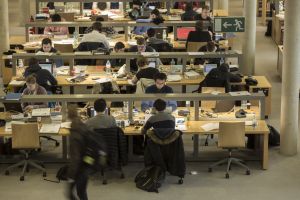Their mission is to facilitate the contact for refugees interested in taking up studies and informing them specifically about the possibilities they have: Five student ambassadors of Karlsruhe Institute of Technology (KIT) will visit refugee and asylum seeker accommodation centers in the city of Karlsruhe and nearby from mid-June on. Male and female students, originally coming from the Arabic region, South Asia, and the Horn of Africa, will first tell about their own road to studying and their experience at the KIT. Then, they will provide information about studying at the KIT and answer questions. Interested institutions and projects have the possibility to invite the KIT student ambassadors via an online form (http://www.sle.kit.edu/english/vorstudium/7561.php).
All student ambassadors are currently pursuing a Bachelor’s or Master’s degree at KIT and are working as research assistants for the KIT International Students Office (IStO). They visit accommodations or training centers to present institutions such as KIT and the higher education landscape in Baden-Württemberg and – using information material in English – speak about studies-related topics such as orientation in studies, self assessment, entry requirements, knowledge of German, German language courses, and ways of financing the studies. They also point out the possibilities of cooperative studies and apprenticeship. “The KIT student ambassadors are our way to actively address refugees interested in studying at a university and to inform them – but we would also like to learn more about the support they actually need to be able to take up studies. With this measure and other actions, we want to emphasize the welcoming culture at KIT, we also would like to contribute to the integration of people who had to flee from their home country in Karlsruhe and Baden-Württemberg,” says Professor Alexander Wanner, Vice President for Higher Education and Academic Affairs at KIT.
The German Academic Exchange Service (DAAD) supports this project by paying for the research assistants. The student ambassadors were trained for their job by the KIT Students Counseling Center (zib). Besides subject-specific background knowledge, the also received further education on counseling in an intercultural context. Besides the zib, the following institutions contributed to training the KIT student ambassadors and creating the information material: the IStO, the Studienkolleg and the MINT-Kolleg, the Language Center, the Institute for German language and literature, the Vocational Training Service Unit of KIT as well as the Studierendenwerk Karlsruhe, the Karlsruhe Chamber of Commerce and Industry, the Federal Employment Agency, the Baden-Württemberg Cooperative State University, and the Karlsruhe University of Applied Sciences. Another important project facilitator is the Karlsruhe Landratsamt (administrative district office).
The KIT student ambassador model for refugees draws on the idea of the “Gescheit studiert” (clever way to study) studies information campaign by the Baden-Württemberg Ministry of Science, Research, and the Arts, where schools invite students (also from KIT) as student ambassadors to their classes for information events.
A visit by the KIT student ambassadors lasts about 90 to 120 minutes and can be organized individually, in general as a presentation or a special information session. Interested institutions are kindly asked to hand in several proposed dates with their registration. Evening dates during the week are also possible. A reasonable group size is up to ten persons who, ideally, speak the same language so that the presentation can be held in that language. The languages offered are Arabic, Amharic, Dari, Pashto, Tigrinya, and Urdu. Thanks to their own experience, the KIT student ambassadors can tell about their individual road to studying and the obstacles they had to overcome, if any. They will help the refugees interested in studying with general and study program-specific online tests for career orientation. The service provided by the student ambassadors is free of charge. Inquiries, also from regional voluntary refugee aid initiatives, can be directed to KIT.
For more information, please visit: http://www.sle.kit.edu/english/vorstudium/7561.php
In close partnership with society, KIT develops solutions for urgent challenges – from climate change, energy transition and sustainable use of natural resources to artificial intelligence, sovereignty and an aging population. As The University in the Helmholtz Association, KIT unites scientific excellence from insight to application-driven research under one roof – and is thus in a unique position to drive this transformation. As a University of Excellence, KIT offers its more than 10,000 employees and 22,800 students outstanding opportunities to shape a sustainable and resilient future. KIT – Science for Impact.

